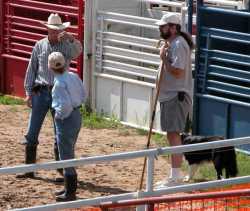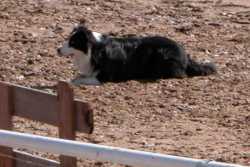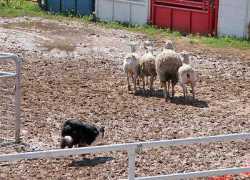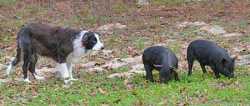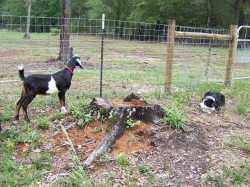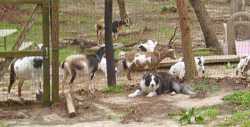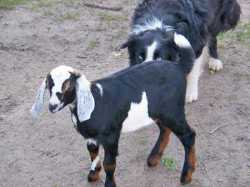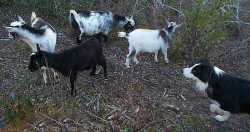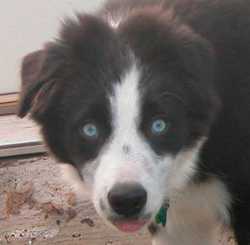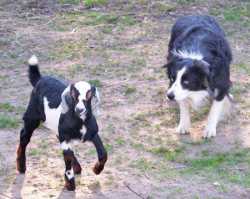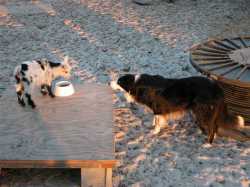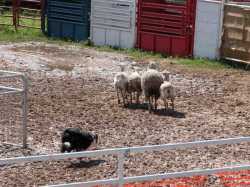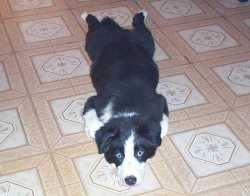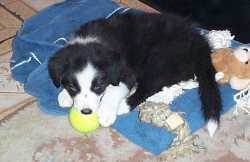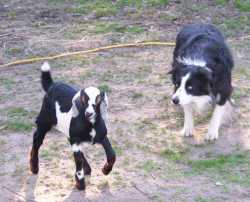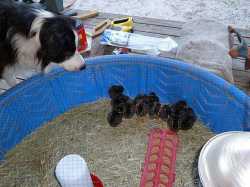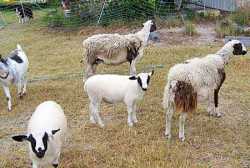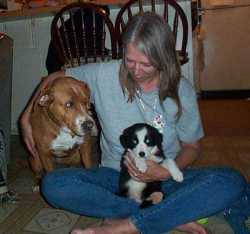 Tennis Balls are still a favorite after all these years
Tennis Balls are still a favorite after all these years
Whenever a person adds a dog to their life, they can expect changes in their daily activities. When I added a border collie named Clyde to our lives, a whole new world opened up.

Left to right Bonnie, Debi, Clyde (Bonnie has just met the little guy)
We got Clyde when he was about 8 weeks old, and he was smart as a whip even then. He was fetching tennis balls the same day I brought him home. He was constantly looking at us, alternately, expectantly and quizzically, as if he were waiting for a command to execute or a mission to embark upon.
After a week or two, I noticed I could direct him which way to circle around the coffee table in the living room with a hand gesture. Sit, stay, lie down were mastered easily with both voice commands and hand gestures. He really was too much, and those piercing blue eyes, always looking to me to see
what new job the "boss" had for him, just knocked me out.
When he was three months old, we took Clyde to a friend's ranch where they raised Boer goats, as well as beef cattle and Mediterranean Miniature Donkeys. There was a herd of maybe 20 young goats, all under a year old, and we released Clyde to see how he would react to his ancestral drives. At first he crouched, nose quivering and looked back and forth between the goats and me. I gestured and told him "Go on" and he snapped into action, not charging into the mass of goat flesh, but circling, tighter and tighter, till he had them in such a tight ball they were starting to panic and our friend, Claire, asked me to call him off for fear of the goats hurting themselves. It hadn't occurred to me that it might be a problem calling an excited puppy off in this situation, but I yelled his name and he broke off and returned obediently to my side. I was so proud I could have almost burst. That was when our lives changed forever.

The first goats that were "his"
When you have the privilege of watching a dog do what it was born to do, it moves you to arrange things in your life so that you can see this thing of beauty over and over. It may be sled dogs, pointers, retrievers, greyhounds, terrier "go to ground", search and rescue, security and attack dogs, or any of the many activities such as agility, fly ball, or even dog dancing, when you see a dog immersed in an activity it clearly enjoys, earnestly trying to please its master, it gives you a warm feeling of well-being. It's as if all the nuisances and annoyances of everyday life drop away and there's just a person and their dog in a beautiful ancient dance.
We already had a shelter dog, Bonnie, when we got Clyde, so we certainly didn't need any more animals in our 800 sq foot house and 50 x 125 lot, but I wanted to see Clyde grow into his potential. We started looking for acreage and found a little over 3 acres less than a mile from our house at the time.
It was totally undeveloped, to the point that the only access to it was a promise of a road to be put in at a later date. Still, it was within our budget and conveniently close, so we became landed folk.
Three acres in Texas is barely a horseshoe pit, but I was determined to put some four-legged animals on it for Clyde to manage. After a bit of research, I decided that Nigerian Dwarf goats would be perfect for our young sheep dog in training, so we set out to locate some. In one of those flukes in which it seems the Universe is actively listening, a casual mention of my plan to a long time friend and associate prompted him to mention that his long time girlfriend's mom just so happened to raise those very goats. I couldn't believe it - I had only stumbled across Nigerian Dwarfs very recently on a Google search, and here was a friend of a friend in the area who had been raising them for years, and had a great need to reduce the size of her herd.
We wound up getting 6 goats: 4 does (one of them pregnant), 1 buck and 1 wether (a neutered buck). This was the start of the GrailQuest Farms herd.

Merlin was our foundation buckling and Clyde was fascinated
The pregnant doe, named Splendid (wishful thinking on the previous owner's part), was the herd "queen" and spent a lot of time butting the lesser does in their sides. When goats are place in new environments with new barn/pen mates, they do a lot of butting to determine the ranking within the herd. It settles down after a few days and everybody mostly gets along, until a new goat is introduced and everybody has to figure out where they are in the pecking order again. It’s kind of like high school.
We let the goats get acclimated to their new surroundings. The goats had never lived outside a pen in a barn, so having over an acre of ground to explore was a real treat for them. Eventually it was time to put them into the barn - Clyde's big moment.
Now these goats were not a cohesive unit as they had all been in separate pens and had no real social bonds, but the sight of a black and white canine slinking around them with head down caused their instinct to bunch up to kick in. Naturally Splendid couldn't just accept being bossed around, even if it was by a predator, so she tested Clyde's mettle with a charge, but Clyde jumped aside and nipped at her as her charge missed. I don't know if he even made contact with skin, he certainly didn't cause her any injury, but he did convince her that the best direction to go was away from this slinking, crouching, nipping creature with the staring blue eyes. I used a few gestures and commands like "go around" and "lay down" (I believe "lie down" is the correct term, but my Texas linguistic idiosyncrasies crept in), and before long all the goats were in the barn. I called Clyde back to me where he greeted me with excited licking and panting and an expression that said, "That was fun! Can we do it again?" I didn't want to stress a pregnant goat too much, but I must admit that I was ready to do it again too.
As a young dog, Clyde used to enjoy fetching from and swimming in the ponds, but as he got older, his main interest was livestock. When we added chickens, he was fixated for days. When a new goat was born he would stare almost motionless for hours. He was absorbed with "his" livestock and ever ready to move them. He had an instinct for just how much pressure to apply with his stalking and eye contact to get them moving without panicking them into a full gallop.
The bad news, or good news depending on how you look at it, was that the goats got used to the daily routine and would put themselves in the barn at feeding time, leaving Clyde nothing to do but make a token roundup on goats that were going into the barn whether he was there or not. This was not really satisfying for either of us, so I decided sheep were required to up the level of challenge.
I knew I didn't want wool sheep because I didn't want to shear them and the Texas heat would be too hard on them if I let them go Rastafarian, so we started looking at the so called “hair” breeds who don't produce wool. There are a few: Barbados, Dorper, St. Croix, Katahdin and a few others. We found a breeder outside San Antonio who had Dorper/St.Croix cross lambs and purchased 3 – 2 ewes and a ram. Since this was to be our founding herd, we named them George Washington, Martha, and Betsy Ross.
 Martha, Betsy and their lambs Blanca and Stew
Martha, Betsy and their lambs Blanca and Stew
They were about 3 months old and totally freaked out by the move, but Clyde and I managed to get them to the back pasture we had separated off for the male goats, and there the fun began.
Sheep tend to bunch up tighter than goats which makes them easier to move through narrow spaces, and allows a greater degree of control with less pressure from the dog. Other than the “outrun”, which is the initial run the dog makes to get to the far side of the sheep in the field to turn them back to the penning area, most of the dog's work is simply loping, walking and lying down. One or two steps can get recalcitrant sheep moving again and lying down allows sheep that are moving too fast to calm down and slow the pace. Over time Clyde learned the ways of sheep and that we wanted to put them in the barn. It would have been nice to have large acreage to be able send him on wide, sweeping outruns and watch him gather the flock from the hills, but we managed to have lots of fun and satisfaction on a couple of acres just moving sheep in different directions around the pond.
As a matter of course, our ewes conceived and grew heavy with lambs. The pregnancy hormones made Betsy Ross irritable and one day she decided she'd had enough of the black and white dog on her heels and she turned on him and charged. Clyde deftly dodged to the side and came back at her, hitting her where her neck joined the shoulder and knocking the surprised sheep over. He didn't bite her, or attack her while she was on the ground – he'd made his point and Betsy learned to respect Clyde from that day on.
We discovered that there was a Scottish Highland Games festival held in the town of Helotes outside San Antonio, and sheepdog trials were a part of the festivities. They had a novice class for inexperienced dogs and we decided we had nothing to lose and it might be fun, so we loaded up Silkie and Clyde and went to San Antonio for the weekend.
We watched some very accomplished dogs moving sheep masterfully and many failed utterly, which was encouraging to me, since Clyde and I had never trained for competition. When our turn came, I sent Clyde on an outrun to gather the four sheep that had been released at the far end of about a 75-yard long enclosure. Clyde started on his outrun but then got sidetracked by the strange smells he encountered on the way. Who were these strange dogs that had been there before him? These weren't his sheep, and this wasn't his pasture. Was it okay to take charge in this new place with these new sheep? I tried to reassure him and urge him on, but by the time we got around behind the sheep time expired. Fortunately there were two runs and on the second run he did much better. We didn't get the sheep penned before time expired, but he had them almost within range for me to sweep them in with my shepherd's crook. This second performance actually won him the novice class and $30, so we broke even on the entry fee. We never competed again, but it is one of my fondest memories of our time with sheep.
One day, George the ram got a bit too full of himself and decided to butt my wife, almost breaking her arm in the process. It was a fatal mistake on his part, and soon we were full of him too, in the form of sausage. We processed the ewes a few months later and thus ended the sheep chapter.
We moved to Trinity, Texas and put in a catfish pond and got some ducks. Clyde was excellent at herding ducks and chickens. We had 5 acres at that point and some shoddy fencing in the back, so he had a chance to round up the goats on the occasions they escaped into the neighbor's pasture.
It was in Trinity where Clyde had his most challenging herding mission. By then we had added a couple of English Shepherds named Sam and Shasta to our mini farm. One night all the dogs were barking frantically so I went out to investigate. The source of the commotion was a wandering skunk. I called the English Shepherds off and put them in the house. Meanwhile, Clyde was on point back at the skunk. I had a shotgun, but I really didn't want to shoot a skunk so close to the house and have the whole yard filled with the aroma for days afterward. Clyde had a better idea and started herding the skunk away from the house! Talk about a dog with finely tuned instincts about how much pressure to apply when moving stock. In 5 minutes we had the skunk to the edge of the woods, and neither Clyde nor myself was tainted in the least. Good dog!
We moved again, this time near the central Texas town of Seguin, about 30 miles from San Antonio. The place was ten acres divided into two pastures for male and female goats respectively. Debi decided we needed a younger buck to replace our aging buck, Puck.
Disco was a small white goat with a nice long beard, but a highly nervous disposition. I carried him to the back pasture and set him down. He immediately ran to the farthest corner of the property and stayed in the corner all day. When feeding time came and it was time to put the goats up in the barn, we had to press Clyde into service. I think Disco was too fearful to move. Clyde tried a few times to get behind him and move things along, but Disco always turned to face him, rather that moving away in the opposite direction. Both animals were getting more tense as the standoff dragged on. They were standing face to face about 2 feet apart when Disco suddenly charged and butted Clyde right on top of his head. Clyde was visibly shaken and was a bit unsteady on his feet. We did eventually get Disco in the barn, but Clyde was never the same after that encounter. We noticed his hearing diminish and then disappear soon afterward. He was still a great dog and responded well to hand signals, but the days of giving voice commands, and trusting him to carry them out, were over.
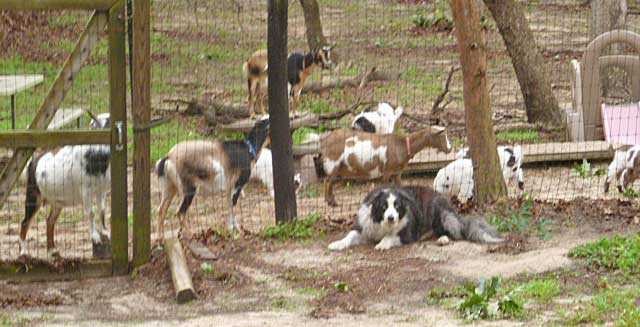 Clyde is 14 years old now, and he doesn't get around very well, but every new goat kid born on the farm still gets his undivided attention for days on end. Border Collies are NOT for everybody, but if you have the time and the lifestyle to devote the time and attention they require, you will be rewarded with an experience most dog owners can only dream of.
Clyde is 14 years old now, and he doesn't get around very well, but every new goat kid born on the farm still gets his undivided attention for days on end. Border Collies are NOT for everybody, but if you have the time and the lifestyle to devote the time and attention they require, you will be rewarded with an experience most dog owners can only dream of.
 GrailQuest Services
GrailQuest Services